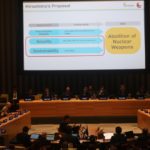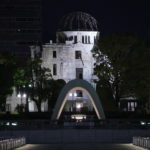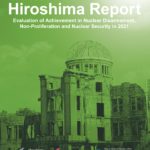Hiroshima Report 2023Column 3 Views on the First Meeting of States Parties to the Treaty on the Prohibition of Nuclear Weapons and Future Prospects
Shizuka Kuramitsu
The First Meeting of States Parties (1MSP) to the Treaty on the Prohibition of Nuclear Weapons (TPNW) took place in Vienna, Austria from June 21 to 23, 2022. Representatives of 49 states parties, 34 observer states, various international organizations, and 85 non-governmental organizations (NGOs) attended the conference to discuss the objectives of the TPNW, with a focus on concrete steps toward the total elimination of nuclear weapons. On the final day, the 1MSP adopted the Declaration and the 50-point Action Plan, and it was decided that the second Meeting of States Parties (2MSP) will be held in New York in November 2023.5
At the 1MSP, a palpable sense of excitement and expectations for the TPNW could be observed, with active participation from state parties and NGOs. Although only a few states participated as observers, it was significant that each state shared their own position and participated in dialogue on specific agenda items. Switzerland and Germany, for example, both expressed interest in the TPNW’s provision of victim assistance and environmental remediation, and also touched upon the possibility of exploring complementarity of the TPNW with the Nuclear Non-Proliferation Treaty (NPT) and/or other disarmament and non-proliferation treaties.6 In light of this, it was disappointing that more states did not participated as observers. Some states that remain outside the TPNW could nonetheless have offered much to discussion around issues such as victim assistance. It is hoped that the number of observers will increase at the 2MSP.
On the other hand, there remains a significant challenge in gaining the support, signature, and ratification of the TPNW from nuclear-armed states and their allies under the “nuclear umbrella.” The crisis in Ukraine has further brought attention the risk of nuclear weapons use. Notwithstanding the urgent need for risk reduction measures at the bare minimum, we are witnessing trends that are not necessarily compatible with the disarmament objectives of the TPNW. The TPNW took a normative approach centered on the rethinking of global security and the appeal of humanitarian consequences of nuclear weapons use, making nuclear weapons illegal in the nations party to it. However, the nuclear armed states and other states under the “nuclear umbrella” continue to support a gradual approach centered on the NPT regime, and continue to maintain their attitude that they cannot sign and ratify the TPNW due to concerns about the tense security landscape as well as the feasibility of the TPNW verification regime.7
Furthermore, the international community continues to become increasingly multipolar and riven with tension and division. Two months after the 1MSP, the 10th NPT Review Conference (RevCon) failed to adopt a substantive final document, as was also the case in the previous conference. Following the NPT, at the First Committee of the UN General Assembly the complex structure of confrontations within the five nuclear-weapon states (NWS) under the NPT, between NWS and non-nuclear-weapon states (NNWS), and between NWS with their allied states and states parties to the TPNW, were highlighted. Additionally, states parties to the TPNW also seem to have different perspectives on the treaty.8 At the 10th NPT RevCon, there are some states parties to the TPNW that expressed dissatisfaction with the rigidity of the discussions within the NPT, while others expressed hesitancy at the incorporation of a gender-equality perspective into the disarmament and nonproliferation agenda.9 On the other hand, there are also non-signatories and NWS that do not endorse the TPNW yet have expressed active interest in a disarmament approach respecting gender diversity.
In order for TPNW-promoting states to overcome these divisions, there is a need to continue dialogue with states adopting different approaches, and discuss ways of ensuring security that do not rely on nuclear weapons. At this time of ongoing debate regarding the arms race and the role of nuclear weapons—as well as the continued complex state of various conflicts, it is more critical than ever for civil society to maintain interest in and concern for nuclear issues. As highlighted in the outcome documents of the 1MSP, advancing the TPNW is not only the role of diplomats and policymakers, but also that of civil society. In order to progress the disarmament agenda outlined by the TPNW, it will be vital to strengthen and enlarge the norms established by the treaty. Collective efforts and actions on the part of TPNW-promoting countries and civil society to raise awareness about the importance of disarmament and humanitarian consequences of nuclear weapons use will play a key role in supporting these goals.
Shizuka Kuramitsu: Graduate student, Master of Arts in Nonproliferation and Terrorism Studies, Middlebury Institute of International Studies at Monterey
5 TPNW/MSP/2022/6, July 21, 2022.
6 “Statement by Germany,” First Meeting of States Parties to the Treaty on the Prohibition of Nuclear Weapons (1MSP of the TPNW, June 22, 2022; “Statement by Switzerland,” 1MSP of the TPNW, June 22, 2022.
7 “Speech by NATO Secretary General Jens Stoltenberg,” the 16th Annual NATO Conference on Weapons of Mass Destruction, Arms Control, Disarmament and Non-Proliferation, November 10, 2020, https://www.nato.int/cps/en/natohq/opinions_179405.htm.
8 Reaching Critical Will, Nuclear Ban Daily, Vol. 3 No. 3, June 22, 2022, https://www.reachingcriticalwill. org/images/documents/Disarmament-fora/nuclear-weapon-ban/1msp/reports/NBD3.3.pdf.
9 Reaching Critical Will, NPT News in Review, Vol. 17 No.7, August 18, 2022, https://reachingcriticalwill. org/images/documents/Disarmament-fora/npt/NIR2022/NIR17.7.pdf.







